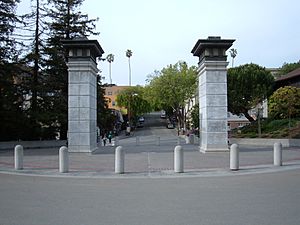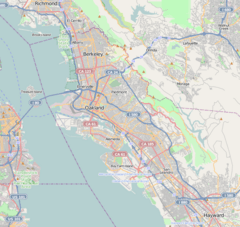Northside, Berkeley, California facts for kids
Quick facts for kids
Northside
|
|
|---|---|
|
Neighborhood of Berkeley
|
|

A view of the Euclid Avenue business district, through the university's North Gate
|
|
| Country | United States |
| State | California |
| County | Alameda |
| City | Berkeley |
Northside is a neighborhood in Berkeley, California. It's mostly a place where people live, located just north of the famous University of California, Berkeley campus. You can find a small shopping area at Euclid and Hearst Avenues, which is like a northern entrance to the university. This area is also home to the Graduate Theological Union, which is sometimes called Holy Hill. A small stream called Strawberry Creek flows through Northside, often hidden underground.
Contents
History of Northside
Northside is the oldest neighborhood in the Berkeley Hills. It was first divided into smaller pieces of land in 1889 by George Phelps. He named it Daley’s Scenic Park after the person who owned the land before him, Thomas Daley.
Just two years later, a banker named Frank M. Wilson bought all the land for $4,000 in gold. He then started selling smaller pieces of land for people to build houses on.
Early Homes and Architecture
Building in the neighborhood began in the 1890s with many Victorian-style homes. In 1895, an architect named Bernard Maybeck started designing unique brown-shingle houses. Their steep roofs looked like the hills around them.
Maybeck's ideas about building on hills inspired people in Daley's Scenic Park. In 1898, they created the Hillside Club. This club wanted to protect the hills from ugly construction and unsuitable buildings. They were inspired by the Arts and Crafts movement, which focused on handmade items and natural materials. Important members of this club included Maybeck, Charles Keeler, Benjamin Ide Wheeler, and John Galen Howard.
This area was important for a style of architecture called the First Bay Region Tradition.
The Great Berkeley Fire
Sadly, on September 17, 1923, a big fire swept through Berkeley. It destroyed hundreds of buildings in Daley's Scenic Park. Some houses survived the fire, especially in a triangle-shaped area on the southeastern slopes. Here, you can still find homes designed by famous architects like Maybeck, Julia Morgan, Ernest Coxhead, and A.C. Schweinfurth. These architects were very important to the First Bay Region Tradition.
Many of the houses that burned were covered in brown shingles. After the fire, these were often replaced. In the southern part of the burned area, many stucco apartment buildings were built. In the northern parts, many single-family homes were rebuilt.
Changes Over Time
After the 1923 fire, religious schools bought the cheaper land on Holy Hill. In the 1960s, these schools joined together to form the Graduate Theological Union (GTU). The GTU library, which opened in the 1980s, was built on land where Frank M. Wilson's home had stood for over 80 years.
Across the street, at 1820 Scenic Avenue, was the home of Benjamin Ide Wheeler. He was the president of the University of California from 1899 to 1919. Nearby, you can also see the University's old reception hall. This building was built by University Regent Phoebe Apperson Hearst at 1816 Scenic Avenue. Mrs. Hearst's own house was at 2368 Le Conte Avenue.
Northside used to have many student groups called fraternities and sororities. But in the 1960s, the University asked them to move to the Southside neighborhood. Some of their old houses were taken over by religious schools. Others were bought by the Berkeley Student Cooperative, which provides affordable housing for students. Many more were torn down to make way for university buildings. These include the two Hearst parking garages, Etcheverry Hall (built in 1966), Foothill Student Housing (1990), and Soda Hall (1994).
Notable Places in Northside
Northside has several important and interesting places:
- The Graduate Theological Union and its many member schools are grouped around the intersection of Le Conte Avenue, Scenic Avenue, and Ridge Road.
- Nine student housing cooperatives are located here. These are places where students live together and share responsibilities. The biggest ones are Cloyne Court Hotel and Casa Zimbabwe.
Designated City Landmarks
Some buildings and areas in Northside are considered special and are protected as city landmarks. This means they are important for their history or architecture.
- George Jensen House, 1675 La Loma Ave.
- Beta Theta Pi Chapter House (now Goldman School of Public Policy), 2607 Hearst Ave. at Le Roy Ave.
- Charles Keeler House & Studio, 1770 & 1736 Highland Place
- Weltevreden (now Tellefsen Hall), 1755 Le Roy Ave.
- Rev. Dr. Robert Bentley House, 2683 Le Conte Ave.
- Phi Kappa Psi Chapter House, 1770 La Loma Ave.
- Benjamin Ide Wheeler House, 1820 Scenic Ave.
- Allenoke Manor, 1777 Le Roy Ave.
- Cloyne Court Hotel, 2600 Ridge Road
- Oscar Maurer Studio, 1772 Le Roy Ave.
- Hillside Club Street Improvements in the Daley's Scenic Park Tract
- Annie's Oak, Le Roy Ave. between Le Conte Ave. and Ridge Road
- Laura Belle Marsh Kluegel House, 2667–69 Le Conte Ave.
- Euclid Apartments, 1865 Euclid Ave. at Hearst Ave.
- Phi Delta Theta Chapter House (now New Educational Development Systems], 2717 Hearst Ave.
- Theta Xi Chapter House, (now Kingman Hall) 1730 La Loma Ave.
- Hillside Club, 2286 Cedar Street
- Normandy Village, 1781–1851 Spruce Street
- Joseph W. Harris House, 2300 Le Conte Ave
- Edgar Jensen House, 1670 La Vereda Road
Images for kids
 | Georgia Louise Harris Brown |
 | Julian Abele |
 | Norma Merrick Sklarek |
 | William Sidney Pittman |





